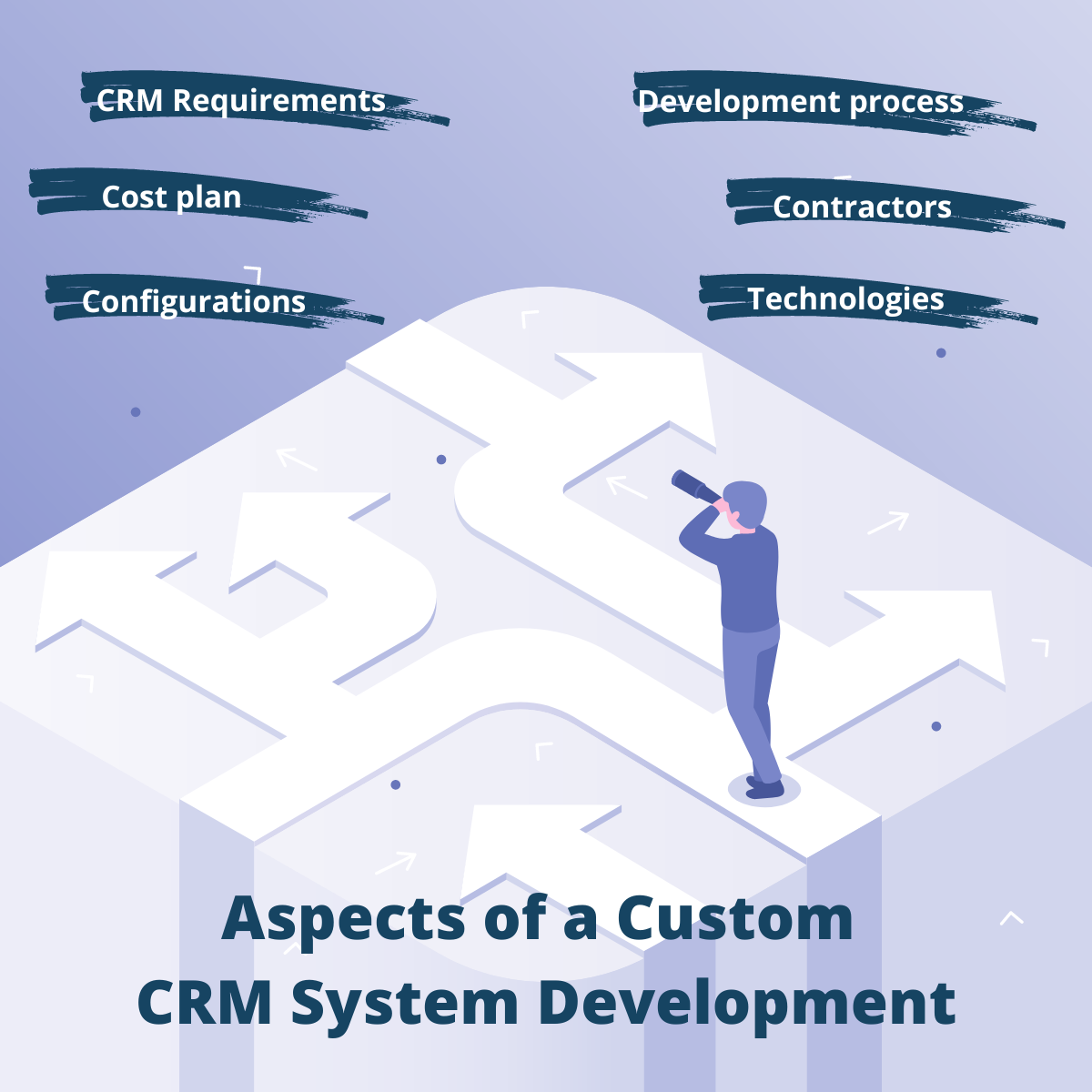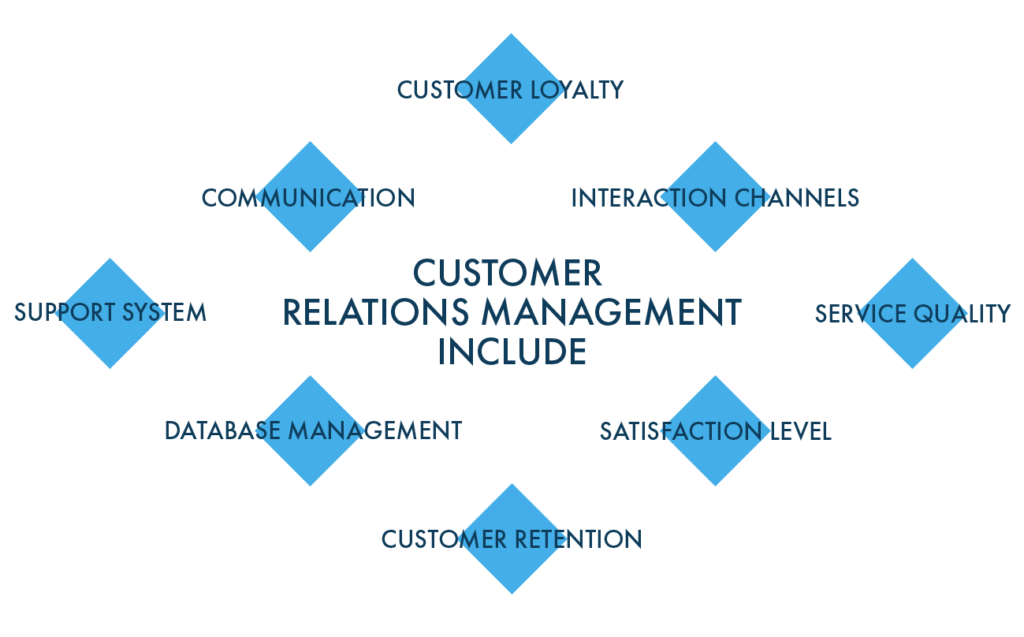If you are here, you might have pondered developing a custom CRM system. Goals definition, in-house or outsourcing software development team, vendor selection, discovery phase, technical tasks, costs management, and different development phases – all these points could seem very complicated.
To find answers to potential questions about CRM development, we had a detailed conversation about bottlenecks with our CTO. In this material, we will highlight some of the important aspects you should consider before starting to develop a custom CRM system.

Content
- CRM requirements: goals definition, the main areas of customer relationships, 3-rd party SaaS or Custom CRM System
- Contractor requirements: in-house team or outsource vendor, vendor selection, negotiation tips
- What do you need to spot at the beginning: cost plan and cost management, communication channels, technologies
- Custom CRM development process: discovery phase, UI/UX design, database development, solution development, configurations, quality assurance, user testing, employee learning
CRM Requirements
Goals definition
First thing first, you should have the answers to these questions:
- What do we want to achieve by implementing this CRM system?
- What needs must be solved?
When you realize which business tasks will be solved by implementing a CRM system, you should assign expected results: saving resources like time, money, and speeding up interaction processes. All those benefits are all-inclusive.
Detect the main areas of customer relationships
A balanced CRM strategy does not only consist of CRM software or application. It covers various aspects of customer service. According to your goals, you may need:
- Operational custom CRM – for automating and optimizing service, sales, or marketing team duties
- Analytical custom CRM – for collecting, processing, and generating reports on customer data
- Customer experience management – for service quality improvement, creating suitable scenarios for interaction through different communication channels

3-rd party SaaS or Custom CRM System?
Next, you determine the tools to achieve the goal. And the main question here is whether you should pick a 3-rd party SaaS solution or develop a custom CRM system. There was another post about the pros and cons of each option here. If your choice is a custom CRM system development, you can entrust it to our engineers.
Contractor requirements. How to
find/choose a contractor?
Development team
So, you decided that your company requires a custom CRM system. The next question to ask is – who will develop a solution: an in-house team or an outsourcing company?
In-house team
If you have a CTO and development team in your company, you can choose this option. But you should notice that for in-time delivery all processes should be perfectly planned, all tasks estimated and engineers have to be experienced in CRM development. If there is a shortage of developers, software architects, or quality assurance engineers, you can contact us for a team extension.
Outsourcing vendor
For example, you decided to hire a vendor. But there are also other options there: to choose a whole team or one freelance software engineer? Before that, you need to assess the scale of work. It is the discovery phase. In most cases, CRM development is quite a big project and needs a team so better to find a partner that provides full-stack custom CRM system development from scratch to launch. This way you will not fool your head with project management.

Vendor selection
How to find a perfect software development contractor? The best choice is to ask your partners if they have a trusted vendor. Maybe, they had similar tasks for a development team and engineers handled them well. But if you don’t have a competitive advisor, you can contact us, and our CTO will consult you about custom CRM development.
Negotiations
To prevent unpleasure surprises, ask a vendor the following questions during the negotiation stage:
- Did the development team implement such projects in the past? Is there a relevant case described in their portfolio? Which results did they achieve as a development team?
- How long has the team been providing custom CRM development services?
- Has the vendor clients’ testimonials about working with their team?
- Which cooperation models do they use?
- When can they start executing?
What do you need to spot at the
beginning?
Cost plan, cost management
To calculate approximate project cost and time frames for the project, you should discuss these with a contractor:
- Can you dedicate your teammates to working with the development team in the phases of requirements analysis, design checks, and user testing? If not, who will be responsible for crucial decisions?
- Is it easy for engineers to get databases or system access?
- What needs to be done to get a solution approval?
- What is the deployment process?
All these aspects influence software costing. There are other factors that affect software development effort and pricing: development team size and seniority, features and functionality of your custom CRM and its type (that’s why you need to determine the goals of creating a CRM system at the very beginning).
Discuss available cooperation models and project cost management with your contractor. You should know when and for what you are paying. It will speed up the development process and eliminate the risks of project interruption.
Communication
Make sure your communication with a potential vendor will not suffer. Decide who will lead this project, formulate technical specifications, look at the result, give feedback, do intermediate reviews, and participate in meetings with performers (once a week – periodically). Both from your and the vendor’s side. It is necessary to designate what process will be used for meeting plan building. Aspects to pay attention to:
- Periodic sync up for current development processes status updating
- Demo version testing
- Feedback providing system
- Connection channels
Technologies
What is the proper way to choose project technologies? How to understand that vendors do not provide services with technologies that are no longer relevant? Just check the technology’s stable release date. Also, you can check if this technology or tool is popular – check the number of specialists who work with it. Is there a language or platform at the top of professional portals?

Development process
You need to rationally approach the CRM development process so that it meets the project deadlines and requirements.
To achieve this goal, you will have to face some challenges. You’ll need to involve your employees in the development process – whom and how? You may have to add a lot of features in the middle of it, spending additional time and money – how to minimize expense? It is always better to approach all stages in the beginning and know how to cooperate with the developers efficiently.
Discovery phase
This is not a development yet, but a study of business needs and its assessment, preparation of technical documentation, creation of layouts (wireframes), drawing up a project plan, and workflow decomposition.
And this will ultimately give an assessment. Then it will be clear how much resources need to be allocated: in terms of money, time, and what team is required for the development.
Question: who will execute the discovery? It could be a single specialist or company (divided into two types: outsource discovery company or outsource software development company, that specializes in custom CRM creation). It is a paid service and takes 2-3 weeks. It is inexpensive relative to the total cost of the project but will save resources in the future. Pay attention, that the in-house manager couldn’t assess the project complexity if they aren’t a CRM development specialist. He can only draw up a technical specification and participate with the vendor in assessing the requirements.
If there is no contractor on your mind, then you can ask your partners/business colleagues for reviews and suggestions, or contact us.
The results of the discovery phase: project plan, software requirements, cost, and effort estimation.
Layout creation
You’ll come back to the definition of the goal here. What kind of CRM system does your company need? Will you be quite satisfied with the simple interface but a strong database? Or is it crucial to automate all processes for your employees and make them intuitive? At this stage, designers discover user experience and create user-friendly interfaces. Think what main and additional features should be implemented:
- built-in letters sending;
- funnels constructing and visualization;
- task calendar;
- integration with IP telephony;
- automatic documents uploading and parsing;
- generating reports, etc.
The result of the layout creation: CRM system design (its structure and appearance).
Database development – Business processes mirroring
The database should work for workflow optimization. So you need not only a great vision but also a strong database structure and logic that smoothly reflects the business processes and functions. To get it, you should detect the main areas of customer relationships.
The result of database development: mirrored business process into the data structure.
Solution development
Once engineers receive the system requirements and CRM design, they begin to build the back-end and front-end parts. Depending on the management methodology, clients are involved in the process of evaluating implemented features. Keep in mind that at least once a week you need to set aside time to call the development team.
The result of solution development: an MVP of your future CRM system.
Adjustments – Configurations
A custom CRM must be suitable for all employees. Think about the levels of database access through the system, and the functionality required for each department. Perhaps you need to create several different configurations?
Business trends are constantly developing. You may need to scale your custom CRM system in the future. Be prepared to allocate a budget to update the modules and processes.
The result of solution development: a custom CRM system with needed configurations.
Quality assurance and user testing
It is better to identify bugs and fix them in the development phase than to find something after launch. Even senior developers and magicians couldn’t create a solution without any bugs. That is why there will be quality assurance engineers in the development team.
But only you and your colleagues know your software expectations. Some of the requirements could be mentioned or formed in the wrong way. And here comes Quality management.
Define which employees from your side will take part in the CRM review. It can be a product owner, or somebody from the company’s top management (like CTO, or tech lead). Launch the project only after a responsible person for the CRM quality from your side approves it.
The result of solution development: a custom CRM system that meets all software requirements that were mentioned in the technical task.
Employees learning
Custom CRM development is a huge deal but it still needs to be implemented. And if your company has about 50-100 employees working with this solution, there may be troubles. This is a whole range of activities. Project documentation and user manuals will be very practical for you during the implementation phase. Video tutorials are very convenient for learning software. Ask the vendor to prepare it when writing a technical assignment.
In conclusion, we would like to say
Even the preparatory process for a custom CRM creation could seem too elaborate, not to mention negotiation and development phases. You have to set aside additional time, money, and part of your team to deal with all mentioned challenges. But workflow automation is not only a digitalization trend. It is also an instrument for saving working hours and employees’ effort for key tasks, highlighting insights for increasing profit and bringing you more control through your business.
And remember, if you have any questions about aspects you consider while developing a custom CRM system, you can always set up a call with our team!
